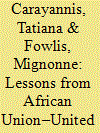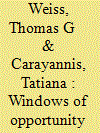|
|
|
Sort Order |
|
|
|
Items / Page
|
|
|
|
|
|
|
| Srl | Item |
| 1 |
ID:
154381


|
|
|
|
|
| Summary/Abstract |
Having hosted nearly a dozen peacekeeping and peacebuilding efforts since the mid-1990s, the Central African Republic (CAR) has been a laboratory for peace interventions – an ‘early adopter’ of various peace initiatives. It is thus a useful case from which to draw preliminary conclusions about the roles of the United Nations (UN) and regional organisations in resolving conflicts that involve entire regions. This article examines the roles of the UN and the African Union (AU) in CAR, where there is a long history of successive conflict resolution efforts that have been overseen by the international community and the region alternatively. The AU, regional economic communities (RECs) such as the Economic Community of Central African States (ECCAS), and regional leaders have also played important roles during the many initiatives aimed at resolving conflict in CAR. This article analyses the responses and relationship between these institutions and actors, beginning with the deployment of an inter-African monitoring mission in 1997. It is argued that peace operations in CAR have lacked a clear political strategy and a clear understanding of the situation, as well as the necessary sustained engagement from both regional and international actors. It is further argued that each subsequent intervention has added an additional layer to the previous one, thus creating a proliferation of peace operations whose mandates, troop contingents and leadership have not always been fit for purpose.
|
|
|
|
|
|
|
|
|
|
|
|
|
|
|
|
| 2 |
ID:
058638


|
|
|
| 3 |
ID:
086436


|
|
|
|
|
| Publication |
2009.
|
| Summary/Abstract |
Analysts usually identify two United Nations, one composed of member states and a second composed of the secretariats. A third UN should also be recognized, composed of actors that are closely associated with the world organization but not formally part of it. This "outside-insider" UN includes nongovernmental organizations, academics, consultants, experts, independent commissions, and other groups of individuals. These informal networks often help to effect shifts in ideas, policies, priorities, and practices that are initially seen as undesirable or problematic by governments and international secretariats.
|
|
|
|
|
|
|
|
|
|
|
|
|
|
|
|
| 4 |
ID:
153844


|
|
|
|
|
| Summary/Abstract |
Member states, nudged along by the 1-for-7-billion civil society campaign, made the selection process somewhat open and transparent for the ninth UN secretary-general. The campaign overlooked an essential consideration: on 1 January 2017 a ‘honeymoon’ began. The position still may be what the first secretary-general Trygve Lie called ‘the most impossible job in the world’, but the post-Cold War era has provided secretaries-general with significant possibilities for institutional housecleaning. History provides lessons for 2016's successful candidate. In looking to the next five years, it would be wise to examine how the last four UN secretaries-general pursued institutional change, and when they were effective in altering structures and staffing. The chances for conceiving significant change and starting the arduous path toward implementation are enhanced during the first months of a secretary-general's mandate and again in the twilight when the preoccupations are legacy and the scramble to complete unfinished business. The election of António Guterres provides the occasion to rekindle optimism about the potential for multilateral cooperation. He appreciates the flaws in the structure and staffing of the dysfunctional UN family and hopefully will have the determination to undertake the Sisyphean task of reforming them.
|
|
|
|
|
|
|
|
|
|
|
|
|
|
|
|
|
|
|
|
|